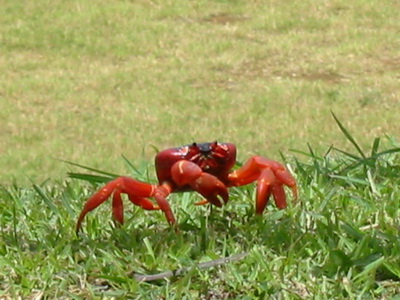|
| Query: Yellow crazy ant | Result: 5th of 8 | |
Christmas Island Red Crab (Gecarcoidea natalis) - Wiki
| Subject: | Christmas Island Red Crab (Gecarcoidea natalis) - Wiki
| |

| Resolution: 400x300
File Size: 70167 Bytes
Date: 2004:01:24 13:14:18
Camera: Canon PowerShot A40 (Canon)
F number: f/4.8
Exposure: 1/800 sec
Focal Length: 518/32
Upload Date: 2007:09:01 13:45:50
|
Christmas Island red crab
From Wikipedia, the free encyclopedia
[Photo] A Christmas Island red crab. Date: 24 January 2004. Photo by http://en.wikipedia.org/wiki/User:Takamaxa
The Christmas Island red crab (Gecarcoidea natalis) is a species of terrestrial crab endemic to Christmas Island and the Cocos (Keeling) Islands in the Indian Ocean. Although restricted to a relatively small area, it is estimated that up to 120 million red crabs may live there, making it the most abundant of the 14 terrestrial crab species on Christmas Island. Christmas Island red crabs eat mostly fallen leaves and flowers, but will occasionally eat other animals, including other red crabs (see cannibalism), if the opportunity arises.
The carapace is up to 116 mm long, rounded, and encloses the gills. The claws are usually of equal size, unless one becomes injured or detached, in which case the limb will regenerate. During that time, it will be the smaller of the two. The male crabs are generally larger than the females, while adult females have a much broader abdomen and usually have smaller claws. The broader abdomen of the female Christmas Island red crab only becomes apparent in the third year of growth. They live in burrows, in order to shelter from the sun. Since they still breathe through gills, the possibility of drying out is a great danger for them.
Christmas Island red crabs are famous for their annual migration to the sea in order to lay their eggs in the ocean. During the migration, the crabs cover the routes to the coast so densely that they can be seen from the air. Volunteers shovel the crabs off the roads and, although no harm is intended, some of the countless millions of crabs inevitably get injured.
Early inhabitants of Christmas Island hardly ever mentioned these crabs. It is possible that their famous large population size was caused by the extinction of Maclear's Rat, Rattus macleari in 1903. It is possible that these endemic rats kept the crab's population in control.
An exploding population of the Yellow crazy ant, an invasive species accidentally introduced to Christmas Island and Australia from Africa, is believed to have killed 15-20 million red crabs in recent years.
http://en.wikipedia.org/wiki/Christmas_Island_red_crab
| The text in this page is based on the copyrighted Wikipedia article shown in above URL. It is used under the GNU Free Documentation License. You may redistribute it, verbatim or modified, providing that you comply with the terms of the GFDL. |
|
^o^
Animal Pictures Archive for smart phones
^o^
|
|

